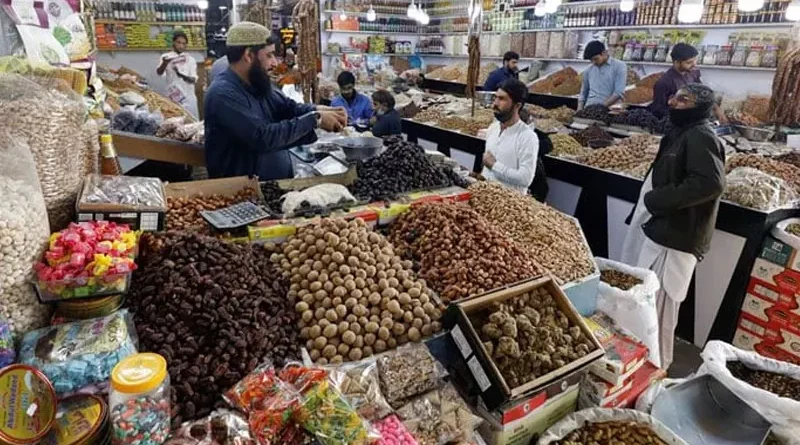Weekly inflation down by 0.78% but still far above last year’s level
ISLAMABAD: The Sensitive Price Index (SPI) inflation eased slightly in the week ending February 15, but remained high compared to the same period last year, as food and energy prices continued to soar, official data showed on Friday.
The SPI, which tracks the weekly changes in the prices of 51 essential items, fell 0.78% from the previous week, according to the Pakistan Bureau of Statistics (PBS). However, the SPI rose 34.25% year-on-year, indicating the persistent pressure on the cost of living in the country.
In the previous week, the SPI on a year-on-year basis was 39.22%. The PBS’s latest SPI snapshot which gauges mostly kitchen items and its data from 17 urban centres, revealed an increase in prices of 22 items, a decline in 11 items and no change in 18 items.
In a span of one week, prices of bananas went up by 4.64% to Rs127 per dozen, potatoes 2.8% to Rs56/kg, matchbox 1.31% to Rs6.18/box, long cloth 1.3% to Rs573/metre, cooked dal 0.8% to Rs144/plate, shirting (average quality) 0.63% to Rs421/meter, moong pulse 0.56% to Rs309/kg, rice basmati (broken) 0.56% to Rs225/kg, mutton (average quality) 0.5% to Rs1751/kg, cooked beef 0.39% to Rs276/plate and mash pulse by 0.35% to Rs549/kg.
However, on a week-on-week basis, prices of eggs fell by 29% to Rs280/dozen, chicken farm (live) by 4.23% to Rs449/kg, onions by 3.5% to Rs202/kg, LPG 11.67kg cylinder by 2.85% to Rs3,246. Similarly, the gur price was reduced by 1.13% to Rs208/kg, wheat flour bag of 20kg by 0.32% to Rs2801. Tomatoes price was also reduced by 0.3% to Rs108/kg and masoor pulse was reduced by 0.28% to Rs336/kg over theprevious week.
The PBS has classified income brackets into five quintiles, each corresponding to specific levels of the SPI. In the lowest quintile, comprising individuals earning up to Rs17,732 per month, the SPI stood at 28.68%. For those in the highest income bracket, spending more than Rs44,175 per month, the SPI was recorded at 32.08%. Meanwhile, individuals falling within the middle quintile, with incomes ranging from Rs22,889 to Rs29,517, experienced an SPI of 38.54%.
Critics suggest that these income quintiles, particularly those with lower incomes, may not accurately reflect the socioeconomic reality, citing the fact that Pakistan’s minimum wage is Rs35,000 per month. They advocate for a revision of these income brackets to better capture the true economic landscape.
A significant feature of the weekly bulletin was that the year-on-year increase in the prices of some necessities and kitchen items was exorbitant. Notable among these are gas charges for Q1 (1108.6%), tomatoes (134%), chillies powder (81.7%), cigarettes (77%), wheat flour (66%), gents’ sponge chappal (58%), sugar (55%), gents’ sandals (53%) and gur by 49%. Similarly, salt powder price increased by 40%, tea Lipton by 33%, garlic by 32%, and rice IRRI-6/9 by 30%.
Besides, mash pulse and garlic were expensive by 32% each, basmati rice broken by 27%, potatoes by 25%, powder milk by 22%, fresh milk and masoor pulse by 20% each, and electricity charges for Q1 were expensive by 15.44% over prices in the same week of last year.
Whereas, year-on-year prices witnessed a decrease in bananas (18%), mustard oil (16%), vegetable ghee 1-KG (15%), cooking oil and vegetable ghee by 10%. LPG was more expensive by 8.5% over last year.

